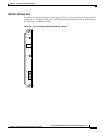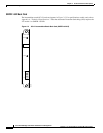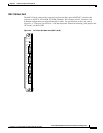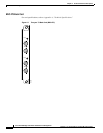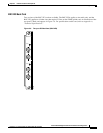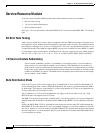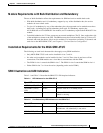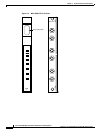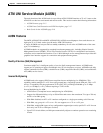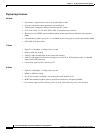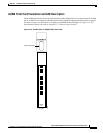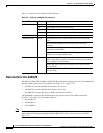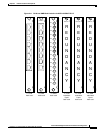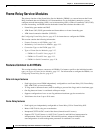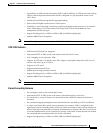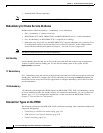
2-15
Cisco MGX 8230 Edge Concentrator Installation and Configuration
Release 1.1.31, Part Number 78-11215-03 Rev. B0, May 2001
Chapter 2 Module and Service Descriptions
ATM UNI Service Module (AUSM)
ATM UNI Service Module (AUSM)
The main function of the AUSM cards is to provide an ATM UNI/NNI interface at T1 or E1 rates so that
ATM UNI user devices can transmit and receive traffic. This section contains the following information:
• AUSM Features, page 2-15
• AUSM Front Card Illustration and LED Description, page 2-17
• Back Cards for the AUSM/B, page 2-18
AUSM Features
The MGX-AUSM-8T1/B and MGX-AUSM-8E1/B (AUSM) are multipurpose front cards that use an
eight-port T1 or E1 back card to provide native ATM UNI interfaces.
A single AUSM/B card can provide hot standby redundancy for all active AUSM/B cards of the same
type (1:N redundancy).
AUSM/B modules are supported by standards-based management tools, including Simple Network
Management Protocol (SNMP), Trivial File Transfer Protocol (TFTP) for configuration and statistics
collection, and a command-line interface. Cisco’s WAN Manager service management tool provides full
graphical user interface support for connection and equipment management.
Quality of Service (QoS) Management
Consistent with Cisco’s intelligent quality of service (QoS) management features, AUSM/B cards
support per-VC queuing on ingress and multiple class-of-service queues on egress. AUSM/B cards fully
support continuous bit rate (CBR), variable bit rate (VBR), unspecified bit rate (UBR), and available bit
rate (ABR) service classes.
Inverse Multiplexing
AUSM/B cards also support ATM Forum-compliant inverse multiplexing for ATM(IMA). This
capability enables multiple T1 or E1 lines to be grouped into a single high-speed ATM port. This n x T1
and n x E1 capability fills the gap between T1/E1 and T3/E3, providing bandwidth up to 12 Mbps
(n x T1) or 16 Mbps (n x E1), without requiring a T3/E3 circuit.
Inverse Multiplexing for ATM
• ATM Forum 1.0-compliant inverse multiplexing for ATM (IMA)
• Support for differential delays of up to 200 milliseconds across the constituent T1s (up to 250 ms)
and E1s of an IMA group
• With IMA disabled, each T1 or E1 interface configured as a single port running at full line rate
• With IMA, any group of n x T1s or n x E1s can support an n x T1 or n x E1 port
• With IMA, multiple IMA ports of any configuration supported per card (a specific T1 or E1 line can
be in only one T1/E1 or IMA port at a time)
• Upon T1/E1 circuit failure, an IMA port automatically adjusts to continue operation over remaining
circuits



